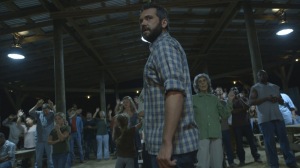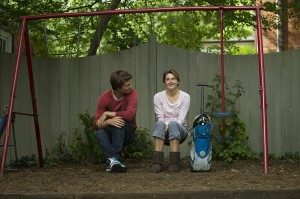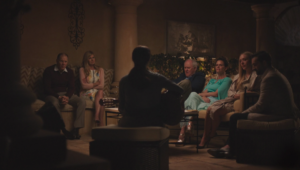
Reviewed for the Miami Gay and Lesbian Film Festival.
We’ve all heard this story. Boy meets boy. Boy likes boy. There are feelings. They’re ignored. They learn about themselves sexually. They kiss. Feelings are accepted. That’s amore. Or something. Like many a gay film, that’s the story of The Way He Looks.
The difference between this film and countless others though lies with the lead character, Leo. He’s a blind high school student with a female best friend, annoying parents, some bullies, and a new kid that he’s sort of starting to fall for. As mentioned, it’s a familiar story, but while the film doesn’t immediately force the two boys onto each other (something to be appreciated), its guiding feature, the young man’s blindness, rarely adds anything to the tiresome queer coming-of-age narrative. Any cuteness that we get out of the relationship between Leo and his crush Gabriel is rashly shoved aside for scenes of teen angst.
Angst! My worst enemy, both when I was young, and now that I’m sort of settled in my twenties. More so now because I remember how frustrating I was when I was at that age. The easiest comparison point for the frustrating scenes between Leo and his jealous best friend (because the boy she likes doesn’t like her) would be Xavier Dolan’s Heartbeats, but at least that film was entirely dedicated to a friend-friend-potential lover relationship. Daniel Ribeiro’s story tries to balance that, but much like the developing relationship, it’s shoved aside for something else. Same thing happens with his parents (arguably the worst scenes in the movie), who only exist so Leo can get mad and consistently play the “you don’t let me do anything because I’m blind” card. If I was still fifteen and I stormed off when my parents said no to me going to another country for months, I’d probably get hit. Here it’s not even particularly dealt with or resolved. It just happens. The dad helps him shave. We move along, back to the slow development of Leo and Gabriel’s relationship and everything else the film wants to try and show, never to return to the concept of his independence. Unless, and this would be a terrifying notion, independence and coming-of-age only means finding love.
As much as the story itself doesn’t appeal to me, it’s clear that Ribeiro and his frequent collaborating cinematographer Pierre de Kerchove have an eye for filmmaking. A couple of great close-up shots utilize the camera to emphasize his blindness. Students messing with him, the boy he likes telling him what’s happening in the film they’re watching, that kind of thing. The rest of the film is shot smoothly, with some solid editing to boot, but the occasional scene and an abuse of racking focus betrays that. The very same close-ups that were once so appealing suddenly become uncomfortable when they get very male-gaze-y* with nude teen characters. It fits in with the mood of the moment — that of a young man figuring himself out sexually — and there’s palpable tension in the air, but for me, it was almost repelling.
There’s only so much teen angst that I can handle after being subjected to a cavalcade of twinks falling in love time and time again. On one hand, I’m thankful that there are films being made about characters with disabilities, and yet, it’d be nice if there was something more to offer than just that angst and drama that comes with a gay teens tale. By no means is The Way He Looks an outright bad film. It certainly has charm, something that will appeal to gay audiences everywhere, but without anything new to add to a story that’s been told too many times for its own good, what’s the point?
*There’s a male gaze/male gays joke to be made there. I won’t make it, but I’m just putting that out there. If the tagline for the movie is allowed to be “Not every love happens at first sight” then I’m allowed to bring that up.
—
The Way He Looks (Hoje Eu Quero Voltar Sozinho) was the opening night film at the Miami Gay and Lesbian Film Festival on May 2nd.
Directed by Daniel Ribeiro; written by Daniel Ribeiro; adapted from the short film Eu Não Quero Voltar Sozinho by Daniel Ribeiro; starring Ghilherme Lobo, Fabio Audi, and Tess Amorim; 95 minutes.



 Derek
Derek
 Isabelle
Isabelle